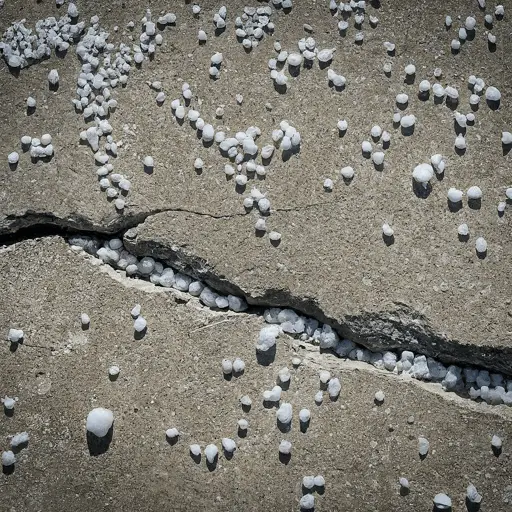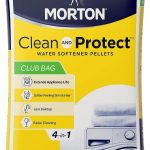That should be one of the common fears that we typically come across. Since most of us use water softeners, it is quite practical to wonder if the water softener salt damages your concrete. Imagine your brine tank has ruptured or you are directed to the water softener drain to the septic tanks built with concrete. It is pretty easy to find out if the water softener salt can damage concrete.
Water softener salt will not damage the concrete on its own. However, there are some additional factors that may cause the concrete to get damaged over a long period of time. Most of these reasons may not be directly related to the salt, but additional reasons that in reaction with the salt may cause issues.
Can Water Softener Salt Damage Concrete?
Key Takeaway
- Water softener salt (sodium chloride) generally won’t directly damage concrete in most situations.
- Research shows minimal impact even with prolonged exposure.
The salt will not have a direct impact on the concrete in most of the situations. However, in some situations, it may cause a few issues over a period of time. Most of the salt used in the water softeners is sodium chloride. Since a similar salt is used for deicing on concrete driveways, you would find it has no issues with the concrete in most cases.

Research has shown that even when the concrete is exposed to salt for prolonged periods, it will have no direct impact on the deterioration of the concrete.
How Can Softener Salt Damage Concrete?
Salt can have harmful effects on concrete in colder climates. This, too, is not because of the direct impact of the salt on the concrete. The effect is primarily due to the other secondary effects that can damage the concrete.
Concrete can be affected in winter due to salt in two ways:
Rebar Corrosion
Salt melts ice, and the ice that melts can seep into the concrete. This is more so when the concrete already has cracks in it. Once the ice and snow reach the inner rebar, it can cause corrosion to set in. Rebar is primarily made of iron, and it is readily affected by corrosion. This corrosive impact is sped up when the water contains salt.
As the rebar corrodes, it expands, causing the concrete to crack further. This will further open up the concrete for more ice to seep in, and the cycle continues.
Spalling
Spalling is another reason that can damage the concrete. When salt is used as the deicing agent, the water and salt get inside the pores inside the concrete. This is called spalling. The ice that gets into the pores in the concrete can begin to freeze and thus make the concrete crack.
Can You Use Water Softener Salt on Your Driveway?
Most of us use salt to deice our driveways. Using the water softener salt to help deice the driveway can come with its own risks. The driveway is made of concrete. It can absorb some water, which results from the melted ice. When there is another cold snap, the water inside the concrete pores can freeze, making the concrete to develop.
If your driveway already has cracks developed in it, there would be a greater possibility of further damage.
Can You Use Water Softener Salt in Septic Tanks?
Key Takeaway
- High-efficiency water softeners usually have minimal impact on septic systems.
- Inefficient softeners and high salt concentrations might affect functionality.
Many water softener users believe that the water softener salt can damage the proper functionality of a septic tank. However, there are several studies that have proved that septic tanks do not necessarily cause any issues with the functions of a septic tank.
Under ideal conditions, the water softener salt will not have any serious impact on the performance of the septic tank. However, very inefficient home softeners (at or below ~1000 gr/lb salt efficiency) may have a negative effect
However, the amount of salt, the salinity of the water, and the crystallization properties of the salt used can have an impact on the functioning of the septic tanks. If you are using a high-efficiency water softener at your home, that should not pose any concern, ideally.
Will A Ruptured Brine Tank Damage Your Concrete Floor?
It will be dependent on the conditions where the brine tank has ruptured. If the region where the brine tank has ruptured experiences freezing temperatures, your floor is likely to develop an issue. Concrete is porous, and water, along with salt, can seep into the concrete
If the salt enters the concrete pores, it will lower the freezing point of the water. This will make the water freeze faster and thus develop cracks in your concrete floor.
How Long Does It Take For Salt To Damage Concrete?
There is no specific time that salt can take to damage concrete. In fact, the water softener salt (or any other salt) does not have a direct impact on the concrete. It can, however, impact the concrete in indirect ways. The damage can, however, take a lifetime to reach the worrying proportions. If the concrete is already in a bad condition, the damage can be quite instant and may take a few months.
New concrete has a water content in it and can get damaged faster when exposed to water softener salt. It can get cracks in just under 30 days. However, older concrete will have only a minor impact. Do note that the new concrete will take at least one year to dry out completely. That is why you should take care of the new concrete for at least a year before using any salt on it.
What factors affect the severity of salt damage to concrete?
The extent of damage caused by the water softener salt can be dependent on several factors. Understanding them can help you plan your damage control exercises in a better way.
Concentration of salt
The concentration of the salt on the concrete will directly affect the damage. A higher concentration of the salt can have a higher impact on the concrete, while a lower concentration can have no impact.
Frequency
The frequency of the exposure to the sale can be yet another factor that would need attention. Continuous and gradual exposure can lead to extensive damage.
Quality of the concrete
The age and quality of the concrete may also have a say in the extent of damage to the concrete. The curing process, the material proportions used in the concrete, and the quality of the material used will also have a say on the extent of the damage.
Conclusion
In most of the cases, the damage caused by the water softener salt on concrete is negligible. If you have older concrete and use high-efficiency water softeners, there should be no concerns whatsoever with the salt damage on the concrete.
Make sure that you are using the water softener salt from a high-efficiency water softener. Also, ensure that the concrete is not new. In any case, the tips above should help you understand how to take care of your concrete against the damage from the water softener salt.











Add Comment